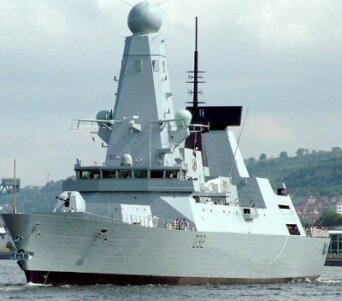- About
- Topics
- Picks
- Audio
- Story
- In-Depth
- Opinion
- News
- Donate
-
Signup for our newsletterOur Editors' Best Picks.Send
Read, Debate: Engage.
| topic: | Human Rights |
|---|---|
| located: | United Kingdom |
| editor: | Gurmeet Singh |
Every few years, the UK goes through a kind of pretend-crisis over nuclear weapons: in choosing whether to allocate more money to its nuclear defence system, the incumbent government goes through the motions explaining that although the choice is heart-wrending and undesirable, renewing the systems must be done. After the tears, hundreds of millions of pounds get tipped into the sector. It’s a show crisis because there’s hardly any serious criticism of renewal allowed; if someone does speak up about it, say Jeremy Corbyn, they’re labelled a weakling and a traitor by the media in perpetuity.
So to Prime Minister Johnson’s announcement that he will make Britain Europe’s foremost naval power. OK, not nuclear weapons, but still: an interesting commitment to make during the pandemic, the closing Brexit negotiations and regime change in the US. The FT writes:
“Boris Johnson has promised the biggest defence investment since the end of the cold war with a £16.5bn military spending boost that he says will “end the era of retreat” and pioneer new technology for the armed forces.
"I have taken this decision in the teeth of the pandemic because the defence of the realm must come first,” the prime minister said ahead of the announcement.
He added that the international situation was “more perilous and more intensely competitive than at any time since the cold war” and that to remain true to its allies, the UK had to commit to upgrading its capabilities.
The spending package is expected to include a boost for the Royal Navy, which Mr Johnson regards as a highly visible representation of his foreign policy, with a crucial role in protecting trade routes.”
It’s highly telling that as Brexit negotiations are coming to an end (and not a positive end), the PM has committed to a massive investment in the navy; it’s very inkeeping with the image of Britain that Brexiteers like: traditional, aggressive, and focussed on trade. Navies have been increasingly described as obsolete in recent years, with cyber warfare and space becoming the new areas of interest; indeed, the PM also committed massive budgets to those two areas. But the rhetorical flourish was reserved for Britain becoming the “foremost naval power in Europe”; the emphasis seems a little suspicious.
What’s more, rights groups and charities were not impressed with increase in the defence budget, arguing that it would come at a cost to the country’s aid spending, and also, to its image:
“Save the Children, Greenpeace UK, Christian Aid, VSO International and others urged the prime minister not to cut Britain’s aid spending while the world was in the throes of the coronavirus pandemic.
“A time when 115 million people look set to be pushed back into extreme poverty, now is the time for an international, collaborative response to Covid-19,” an open letter signed by chief executives and other leaders of the 187 charities said.
The UK is due to host a G7 summit and the COP26 climate change summit in 2021, the signatories noted. “It is a time that requires increased, not decreased, engagement from the British government in its efforts to make the world healthier, safer and more prosperous.”
Britain is now entering a post-EU existence. It has to decide what it wants to be in the world: an outward-facing country which collaborates, or an oddly top-heavy military power.
Image by Jeremy Burrows

